Va pensiero is one of the most famous pieces of Italian opera music.
Composed by Giuseppe Verdi in 1841 for his opera Nabucco, Va pensiero is often referred to as The Chorus of the Hebrew Slaves. Today the Verdi Nabucco Va pensiero chorus is considered by many to be an example the slavery and music genre, as well as, an integral part of Jewish music. Most famous opera singers today have spent time on how to learn to sing opera by rehearsing the musical qualities of Va pensiero.
For G.Verdi, Va pensiero was a turning point in his opera career, which made an impact on the history of opera. Today, many an opera house theatre company include Nabucco de Verdi (that’s ‘by Verdi’ in Italian) in its season repertoire.
Read to Discover Va pensiero – The Chorus of the Hebrew Slaves:
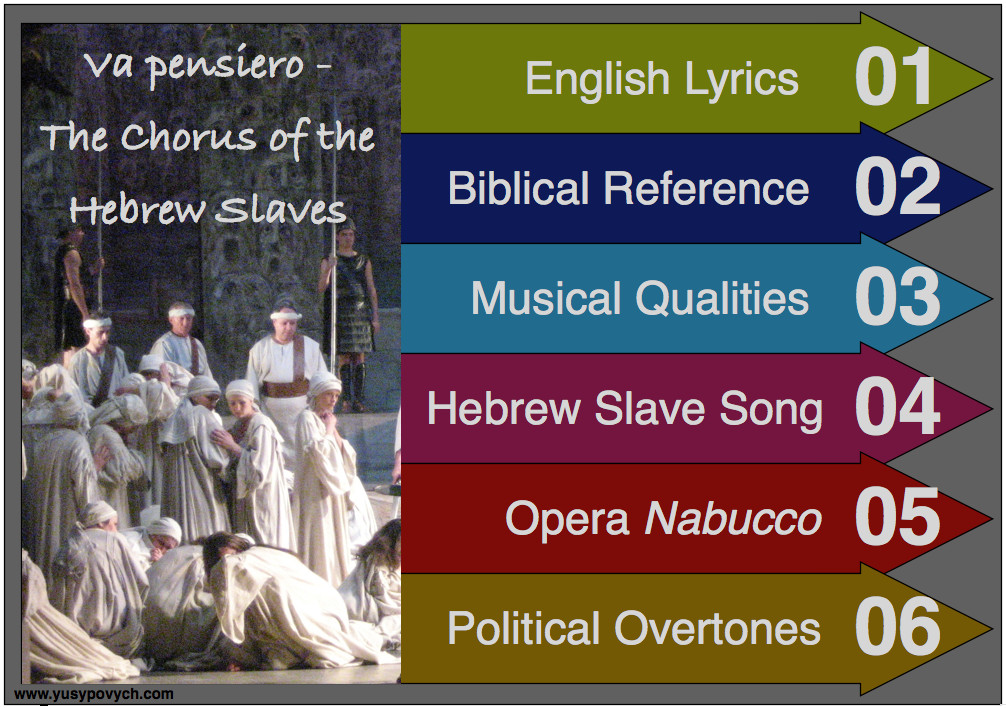
Va pensiero – Giuseppe Verdi’s Opera Nabucco
There are 6 interesting facts about Va pensiero – the Chorus of the Hebrew Slaves from the opera Nabucco, by composer Giuseppe Verdi (1813-1901) and librettist Temistocle Solera (1815-1878).
6. Giuseppe Verdi’s Chorus of the Hebrew Slaves has Political Overtones
5. The Slaves Chorus is a Highly Anticipated Part of the Opera Nabucco
4. Va pensiero is Sometimes Called the Hebrew Slave Song
3. Va pensiero has Highly Developed Musical Qualities
2. The Original Lyrics of Va pensiero are Based on the Bible
1. Multiple English Translations of Va pensiero are available
6. Giuseppe Verdi’s Slaves Chorus has Political Overtones
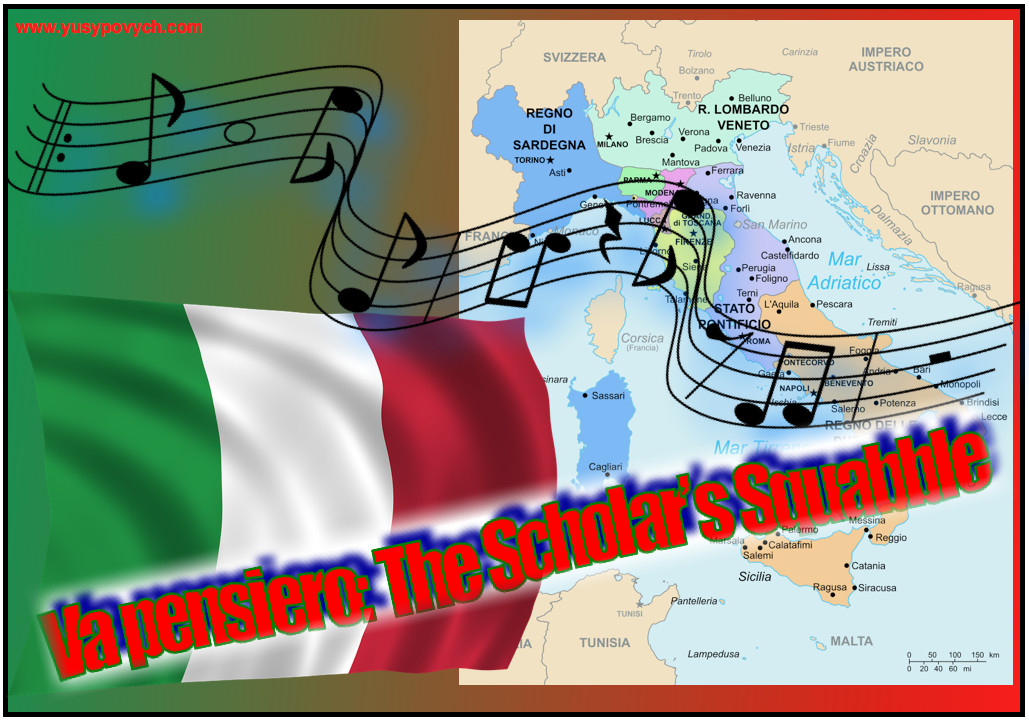
G.Verdi’s Slaves Chorus
Contrary to what some music historians claim, culture plays a significant role in politics. At one time, it was generally accepted that the opera music of Giuseppe Verdi influenced Italian politics in the second half of the 19th century. In the mid 20th century certain scholars began to question this view. This was a time when it became popular to claim that artists and politicians don’t mix.
In his article “Verdi, Politics, and ‘Va, pensiero’: The Scholars Squabble” published in 2005, George W. Martin examines the two perspectives. Martin labels these 2 points of view as “traditionist” and “revisionist”. According to G.W.Martin, the “traditionalists” claim that Giuseppe Verdi became a driving force and the opera chorus Va pensiero became a symbol for the Italian reunification movement and the creation of an Italian state.
George W. Martin states that: “The traditional view of Verdi holds that, on the musical side of Italian life, which then focused on the opera house, he articulated and stimulated the increasing yearning of the people of Italy to be free and united” (p.113). According to Martin, the more recent revisionist view downplays Verdi’s role in Italian politics. The “revisionists” claim that interpretations of Verdi’s music (and Va, pensiero in particular) which focus on the effect it had on Italians and the political climate of the times, are over-inflated.
“…let us agree that Verdi was never a prophet of the Risorgimento. He did not prophesy its coming, foretell its events, or urge people to prepare for it… He does not qualify as one who composed ‘agitator’s music’ to advance a strict political agenda. Nor was he a bard, one who sings his nation’s history and its heroes, as have Russian composers from Mussorgsky to Prokofiev… He was a musician who, composing almost entirely for the theater, there articulated for many people, in consciously allusive arias, duets, or choruses, their still half-formed yearning to be free and united. Doing so, he became a tutor of their growing sense of nationality, and because of it a much-loved figure.”
George W. Martin, 2005:125
Consequently, to claim that a people steeped in musical tradition would disengage their political aspirations of freedom and national unity from their love of music which permeates their everyday life, is just not possible and not logical. Students of musical history, culture and ethnography will find multiple examples of this phenomenon. The discussion of how music and politics interact is a discussion for another day.
5. The Slaves Chorus is a Highly Anticipated Part of the Opera Nabucco

The Hebrew Slaves in the opera Nabucco
Mention the opera Nabucco to an opera lover and immediately thoughts and conversations will turn to Va pensiero – The Chorus of the Hebrew Slaves. It is performed during Act 3 and is a highly anticipated part of Nabucco. Also, Va pensiero is frequently included in choral opera concerts.
According to frequently repeated opera lore, it is claimed that if it weren’t for the choral masterpiece Va pensiero, the opera world might have relegated Giuseppe Verdi to the forgotten stacks of music history. Why?
It is no secret that following the sudden death of his wife and 2 children between 1838 and 1840, Verdi was deeply depressed. On top of his tragic personal loss, his 2 previous operas (Oberto, premiered in 1839 and Un giorno di regno, premiered in 1840) were not popular with the audiences of the day. Thankfully, Bartolomeo Merelli (1794-1879), who was impresario of the opera house LaScala at the time, convinced Verdi to read a libretto by Temistocle Solera (1815-1878).
”Verdi would later report that as he went home, he felt a very deep sadness fill his heart. He flung the manuscript on the table, and lay down. But sleep eluded him. Returning to the table, he found that the manuscript had opened in falling and gazing at the page, he read the words: Va, pensiero, sull’ali dorate. (source – A new window will open.)
Giuseppe Verdi went on to write 34 more operas (a total of 37 operas over a 54 year opera writing career).
4. Va pensiero is Sometimes Called the Hebrew Slave Song
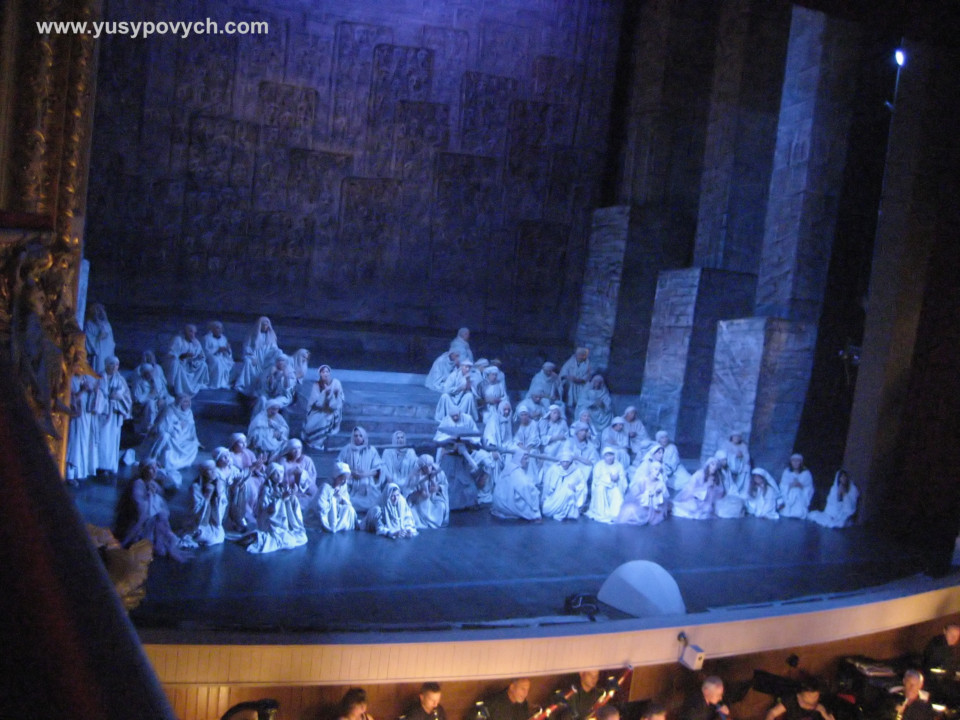
Va pensiero – the Hebrew Slave Song
The Chorus of the Hebrew Slaves or Va pensiero, is a spectacular highlight when attending an opera performance of Giuseppe Verdi’s – Nabucco. Filled with devastating longing for a lost homeland, the opera chorus is based on an historical event.
In the 6th century BC, after a three year siege, the city of Jerusalem was conquered and destroyed by the Babylonian ruler Nabucodonosor. All of the Judah who lived in Jerusalem were taken captive and exiled. During their Babylonian exile, they became slaves.
According to oral and written traditions, the people of Judah believed their horrific exile into Babylon was a well-deserved punishment by Jehovah for the sin of worshipping other deities. Historical evidence confirms that, in time, the Judah returned to Jerusalem from their exile. The oral traditions of the Hebrew people uphold the belief that this homecoming was due to their true forefather’s true repentance.
In G. Verdi’s opera Nabucco the saga of lost freedom, repentance and the renewal of faith is central and depicted through Va pensiero – the Hebrew Slaves Song.
3. Va pensiero has Highly Developed Musical Qualities
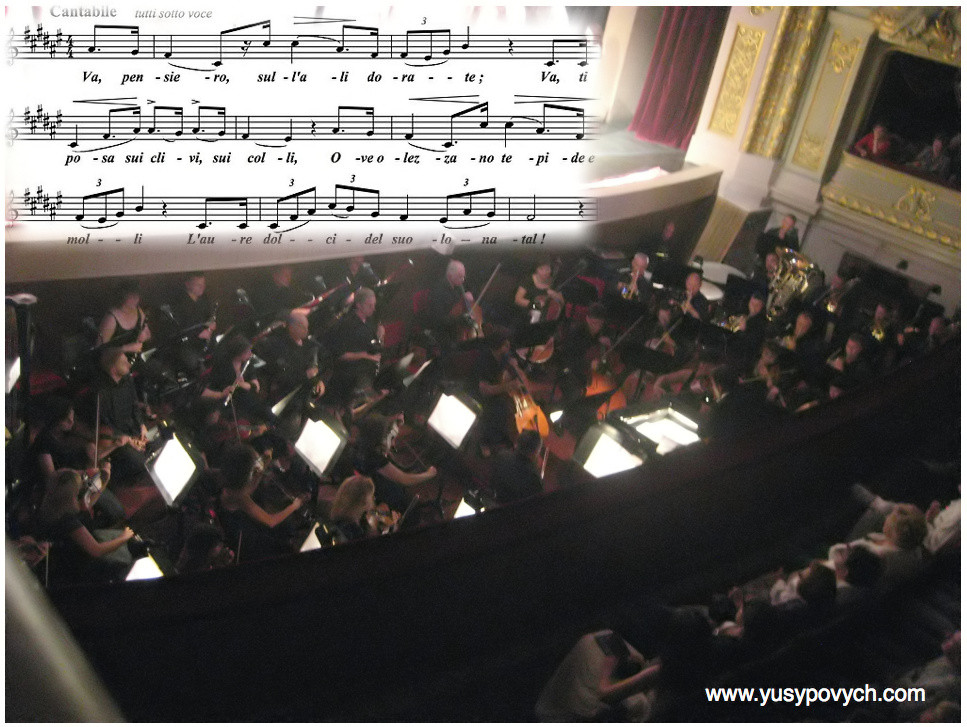
A Musical Definition of Va pensiero
Va pensiero is a choral piece within an opera and has a highly developed musical score. Additionally, Va pensiero passes what is known as “the whistle test” – a tune that can be easily whistled, or, for those who can’t whistle, easily hummed. At the same time, due to its regular “oom-pah-pah” rhythm, if not performed correctly, Va pensiero can sound like a very simplistic piece of music.
We are not going to suggest any specific bad interpretations for you to examine. However, you can first listen to some quality performances and then, afterwards, make a decision based on the knowledge you have gained.
2. The Original Lyrics of Va, pensiero are Based on the Bible
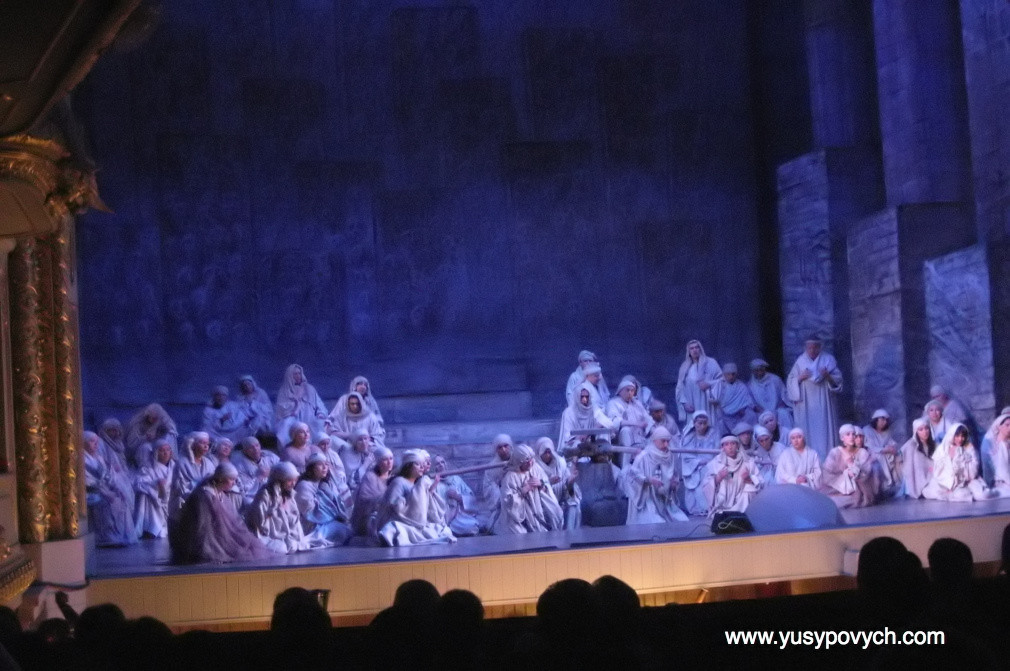
Biblical Opera Lyrics of Va pensiero
The opera chorus Va pensiero is based on the Bible, specifically, the Book of Psalms. The particular Biblical text describes a historical event in the lives of the Judah. In the 6th century BCE, they were in exile and living in slavery far from their native land. The words of the Psalm express their yearning for their homeland and their refusal to bow to the will of their captors.
Interestingly, the words of the Psalm succinctly state that as long as they are in captivity, the Judah will neither play their harps, nor sing their songs. However, opera is a musical genre and in opera, singers perform their words to music. And so, the reinterpretation of the Psalm text includes a reference to the chorus not playing their harps, but omits any mention of no singing. Indeed, the Hebrew slaves, who make up the opera chorus – do sing.
1. There are Multiple English Translations of Va, pensiero
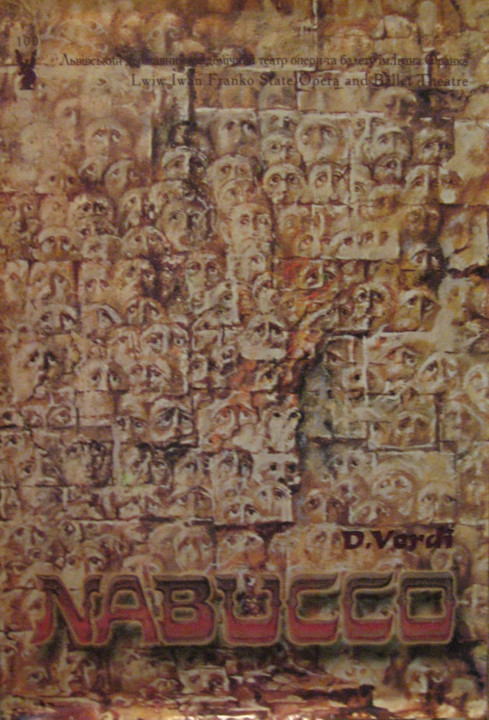
Va pensiero – Best Opera Songs
Translations are a tricky business. It used to be that translators and interpreters would train for months (sometimes years) to grasp the nuances and specifics of their working languages.
Today, with GOOGLE Translate and other popular computer generated translations, anyone can enter text into the left-hand side of the column, press the language of their choice and get a deciphered result. Some such automatically generated translations come up with extremely inaccurate and oftentimes, misleading interpretations.
Lovers of opera, who wish the original lyrics in English translation, need to be very wary of what they might encounter.
Text by Oksana A. Wynnyckyj-Yusypovych
Continue Reading about Giuseppe Verdi – Opera Composer of Va pensiero:
Opera and Classical Music > Va pensiero






